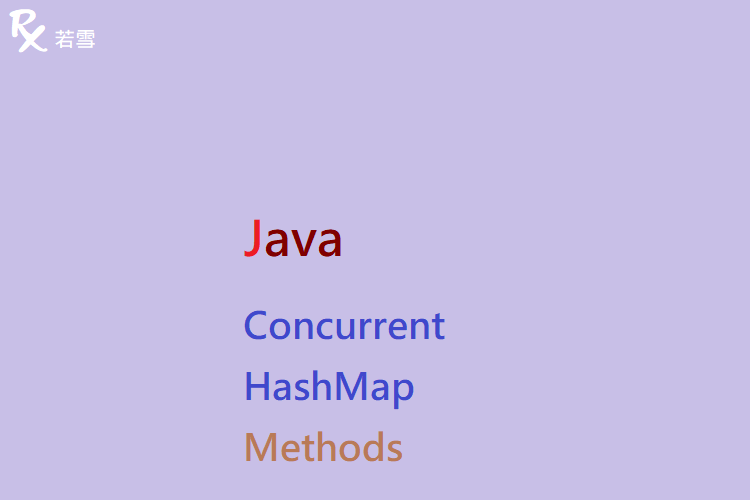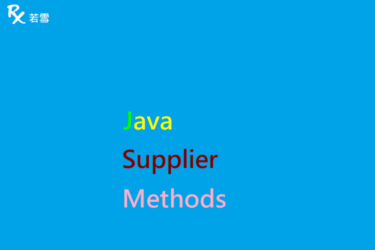Table of Contents
ToggleJava ConcurrentHashMap Methods
屬於 java.util.concurrent 套件,實作了 ConcurrentMap 以及 Serializable 介面,是 HashMap 的增強版本,實現執行緒安全,多個執行緒可以同時存取集合,而不會出現任何同步問題,介紹常見的 put 、 get 、 clear 、 size 等方法,將資料存儲在鍵、值對中,可以通過另一種類型的索引訪問,當插入重複鍵時,會替換相應鍵的元素, ConcurrentHashMap Java Methods 本篇增加了範例,並透過單元測試來驗證產出結果。
檔案目錄
./
+- src
+- test
| +- org
| +- ruoxue
| +- java_147
| +- map
| +- concurrenthashmap
| +- ConcurrentHashMapMethodsTest.java 單元測試
ConcurrentHashMap Methods Java 提供新增、取得、修改、刪除等操作 Map 中的元素。
Fruit
建立 Fruit 物件,覆寫 equals 、 hashCode ,定義屬性和方法,用來建立一個物件。
@NoArgsConstructor
@Getter
@Setter
@Builder
public static class Fruit {
private String name;
private double quantity;
private int type;
public Fruit(String name, double quantity, int type) {
this.name = name;
this.quantity = quantity;
this.type = type;
}
public String toString() {
ToStringBuilder builder = new ToStringBuilder(this, ToStringStyle.JSON_STYLE);
builder.appendSuper(super.toString());
builder.append("name", name);
builder.append("quantity", quantity);
builder.append("type", type);
return builder.toString();
}
public boolean equals(Object object) {
if (!(object instanceof Fruit)) {
return false;
}
if (this == object) {
return true;
}
Fruit other = (Fruit) object;
return new EqualsBuilder().append(getName(), other.getName()).isEquals();
}
public int hashCode() {
return new HashCodeBuilder().append(getName()).toHashCode();
}
}readWriteThrowException
ConcurrentHashMap Methods Java 建立一個 HashMap ,增加三個元素,多執行緒進行讀取元素時,同時寫入元素,會拋出例外。
@Test
public void readWriteThrowException() {
try {
int poolSize = 5;
ExecutorService executorService = Executors.newFixedThreadPool(poolSize);
Map<String, Fruit> map = new HashMap<>();
map.put("Grape", new Fruit("Grape", -1, 1));
map.put("Kiwifruit", new Fruit("Kiwifruit", Double.MAX_VALUE, 2));
map.put("Lemon", new Fruit("Lemon", 1, 3));
for (int i = 0; i < poolSize; i++) {
executorService.execute(() -> {
Iterator<String> it = map.keySet().iterator();
while (it.hasNext()) {
System.out.println(String.format("[%d] %s", Thread.currentThread().getId(), it.next()));
}
});
}
for (int i = 0; i < poolSize; i++) {
executorService.execute(() -> {
map.put("Papaya", new Fruit("Papaya", 1, 1));
});
}
Thread.sleep(2_000L);
} catch (Exception ex) {
ex.printStackTrace();
}
}[12] Grape
[11] Grape
[12] Kiwifruit
[14] Grape
[13] Grape
[12] Lemon
[14] Kiwifruit
[14] Lemon
[15] Grape
[13] Kiwifruit
[11] Kiwifruit
Exception in thread "pool-1-thread-3" Exception in thread "pool-1-thread-1" Exception in thread "pool-1-thread-5" java.util.ConcurrentModificationException
at java.util.HashMap$HashIterator.nextNode(HashMap.java:1445)
at java.util.HashMap$KeyIterator.next(HashMap.java:1469)
at org.ruoxue.java_147.map.concurrenthashmap.ConcurrentHashMapMethodsTest.lambda$0(ConcurrentHashMapMethodsTest.java:79)readWrite
ConcurrentHashMap Methods Java 建立一個 ConcurrentHashMap ,增加三個元素,多執行緒進行讀寫元素時,能夠安全地遍歷集合。
@Test
public void readWrite() {
try {
int poolSize = 5;
ExecutorService executorService = Executors.newFixedThreadPool(poolSize);
Map<String, Fruit> map = new ConcurrentHashMap<>();
map.put("Grape", new Fruit("Grape", -1, 1));
map.put("Kiwifruit", new Fruit("Kiwifruit", Double.MAX_VALUE, 2));
map.put("Lemon", new Fruit("Lemon", 1, 3));
for (int i = 0; i < poolSize; i++) {
executorService.execute(() -> {
Iterator<String> it = map.keySet().iterator();
while (it.hasNext()) {
System.out.println(String.format("[%d] %s", Thread.currentThread().getId(), it.next()));
}
});
}
for (int i = 0; i < poolSize; i++) {
executorService.execute(() -> {
map.put("Papaya", new Fruit("Papaya", 1, 1));
});
}
Thread.sleep(2_000L);
} catch (Exception ex) {
ex.printStackTrace();
}
}[12] Grape
[13] Grape
[12] Kiwifruit
[13] Kiwifruit
[12] Lemon
[13] Lemon
[15] Grape
[11] Grape
[14] Grape
[11] Kiwifruit
[15] Kiwifruit
[14] Kiwifruit
[11] Lemon
[15] Lemon
[14] Lemon
put
ConcurrentHashMap Methods Java 建立一個 ConcurrentHashMap ,增加三個元素。
@Test
public void put() {
int expectedSize = 3;
Map<String, Fruit> map = new ConcurrentHashMap<>();
map.put("Grape", new Fruit("Grape", -1, 1));
map.put("Kiwifruit", new Fruit("Kiwifruit", Double.MAX_VALUE, 2));
map.put("Lemon", new Fruit("Lemon", 1, 3));
System.out.println(map);
assertEquals(expectedSize, map.size());
}{Grape={"name":"Grape","quantity":-1.0,"type":1}, Kiwifruit={"name":"Kiwifruit","quantity":1.7976931348623157E308,"type":2}, Lemon={"name":"Lemon","quantity":1.0,"type":3}}
putIfAbsent
ConcurrentHashMap Methods Java 建立一個 ConcurrentHashMap ,當元素不存在時,新增元素。
@Test
public void putIfAbsent() {
int expectedSize = 3;
Map<String, Fruit> map = new ConcurrentHashMap<>();
map.put("Grape", new Fruit("Grape", -1, 1));
map.put("Kiwifruit", new Fruit("Kiwifruit", Double.MAX_VALUE, 2));
Fruit put = map.putIfAbsent("Lemon", new Fruit("Lemon", 1, 3));
System.out.println(put);
assertNull(put);
System.out.println(map);
assertEquals(expectedSize, map.size());
}null
{Grape={"name":"Grape","quantity":-1.0,"type":1}, Kiwifruit={"name":"Kiwifruit","quantity":1.7976931348623157E308,"type":2}, Lemon={"name":"Lemon","quantity":1.0,"type":3}}
get
ConcurrentHashMap Methods in Java 建立一個 ConcurrentHashMap ,內有三個元素,取得指定 Key 元素。
@Test
public void get() {
double expected = Double.MAX_VALUE;
Map<String, Fruit> map = new ConcurrentHashMap<>();
map.put("Grape", new Fruit("Grape", -1, 1));
map.put("Kiwifruit", new Fruit("Kiwifruit", Double.MAX_VALUE, 2));
map.put("Lemon", new Fruit("Lemon", 1, 3));
Fruit value = map.get("Kiwifruit");
System.out.println(value);
assertEquals(expected, value.getQuantity(), 2);
}{"name":"Kiwifruit","quantity":1.7976931348623157E308,"type":2}getOrDefault
ConcurrentHashMap Methods in Java 建立一個 ConcurrentHashMap ,內有三個元素,取得指定 Key 元素,若不存在傳回預設值。
@Test
public void getOrDefault() {
Map<String, Fruit> map = new ConcurrentHashMap<>();
map.put("Grape", new Fruit("Grape", -1, 1));
map.put("Kiwifruit", new Fruit("Kiwifruit", Double.MAX_VALUE, 2));
map.put("Lemon", new Fruit("Lemon", 1, 3));
Fruit result = map.getOrDefault("", new Fruit("Empty", 0, 0));
System.out.println(result);
assertNotNull(result);
}{"name":"Empty","quantity":0.0,"type":0}update
ConcurrentHashMap Methods in Java 建立一個 ConcurrentHashMap ,內有三個元素,更新指定 Key 元素。
@Test
public void update() {
double expected = 10d;
Map<String, Fruit> map = new ConcurrentHashMap<>();
map.put("Grape", new Fruit("Grape", -1, 1));
map.put("Kiwifruit", new Fruit("Kiwifruit", Double.MAX_VALUE, 2));
map.put("Lemon", new Fruit("Lemon", 1, 3));
System.out.println(map);
Fruit put = map.put("Grape", new Fruit("Grape", 10, 1));
assertEquals(-1d, put.getQuantity(), 0);
System.out.println(map);
assertEquals(expected, map.get("Grape").getQuantity(), 0);
}{Grape={"name":"Grape","quantity":-1.0,"type":1}, Kiwifruit={"name":"Kiwifruit","quantity":1.7976931348623157E308,"type":2}, Lemon={"name":"Lemon","quantity":1.0,"type":3}}
{Grape={"name":"Grape","quantity":10.0,"type":1}, Kiwifruit={"name":"Kiwifruit","quantity":1.7976931348623157E308,"type":2}, Lemon={"name":"Lemon","quantity":1.0,"type":3}}
remove
ConcurrentHashMap Methods in Java 建立一個 ConcurrentHashMap ,內有三個元素,刪除指定 Key 元素。
@Test
public void remove() {
int expectedSize = 2;
Map<String, Fruit> map = new ConcurrentHashMap<>();
map.put("Grape", new Fruit("Grape", -1, 1));
map.put("Kiwifruit", new Fruit("Kiwifruit", Double.MAX_VALUE, 2));
map.put("Lemon", new Fruit("Lemon", 1, 3));
map.remove("Grape");
System.out.println(map);
assertEquals(expectedSize, map.size());
}{Kiwifruit={"name":"Kiwifruit","quantity":1.7976931348623157E308,"type":2}, Lemon={"name":"Lemon","quantity":1.0,"type":3}}clear
ConcurrentHashMap Functions in Java 建立一個 ConcurrentHashMap ,內有三個元素,刪除所有元素。
@Test
public void clear() {
int expectedSize = 0;
Map<String, Fruit> map = new ConcurrentHashMap<>();
map.put("Grape", new Fruit("Grape", -1, 1));
map.put("Kiwifruit", new Fruit("Kiwifruit", Double.MAX_VALUE, 2));
map.put("Lemon", new Fruit("Lemon", 1, 3));
map.clear();
System.out.println(map);
assertEquals(expectedSize, map.size());
}[] size
ConcurrentHashMap Functions in Java 建立一個 ConcurrentHashMap ,內有三個元素,取得長度, ConcurrentHashMap Java Methods 提供範例參考。
@Test
public void size() {
int expectedSize = 3;
Map<String, Fruit> map = new ConcurrentHashMap<>();
map.put("Grape", new Fruit("Grape", -1, 1));
map.put("Kiwifruit", new Fruit("Kiwifruit", Double.MAX_VALUE, 2));
map.put("Lemon", new Fruit("Lemon", 1, 3));
System.out.println(map.size());
assertEquals(expectedSize, map.size());
}
3putAll
ConcurrentHashMap Functions in Java 建立兩個 ConcurrentHashMap ,內各有三個元素,合併成為一個 Map , ConcurrentHashMap Java Methods 提供範例參考。
@Test
public void putAll() {
int expectedSize = 6;
Map<String, Fruit> map = new ConcurrentHashMap<>();
map.put("Grape", new Fruit("Grape", -1, 1));
map.put("Kiwifruit", new Fruit("Kiwifruit", Double.MAX_VALUE, 2));
map.put("Lemon", new Fruit("Lemon", 1, 3));
Map<String, Fruit> newMap = new ConcurrentHashMap<>();
newMap.put("Apple", new Fruit("Apple", 4, 1));
newMap.put("Banana", new Fruit("Banana", 5, 1));
newMap.put("Cherry", new Fruit("Cherry", 6, 1));
map.putAll(newMap);
System.out.println(map);
assertEquals(expectedSize, map.size());
}{Apple={"name":"Apple","quantity":4.0,"type":1}, Cherry={"name":"Cherry","quantity":6.0,"type":1}, Grape={"name":"Grape","quantity":-1.0,"type":1}, Kiwifruit={"name":"Kiwifruit","quantity":1.7976931348623157E308,"type":2}, Lemon={"name":"Lemon","quantity":1.0,"type":3}, Banana={"name":"Banana","quantity":5.0,"type":1}}isEmpty
ConcurrentHashMap Functions in Java 建立一個 ConcurrentHashMap ,檢查是否為空 Map , ConcurrentHashMap Java Methods 提供範例參考。
@Test
public void isEmpty() {
Map<String, Fruit> map = new ConcurrentHashMap<>();
System.out.println(map.isEmpty());
assertTrue(map.isEmpty());
map.put("Grape", new Fruit("Grape", -1, 1));
System.out.println(map.isEmpty());
assertFalse(map.isEmpty());
}
true
falseConcurrentHashMapMethodsTest.java
ConcurrentHashMap Methods in Java 新增單元測試,驗證 ConcurrentHashMap Functions in Java 是否符合預期。
package org.ruoxue.java_147.map.concurrenthashmap;
import static org.junit.Assert.*;
import java.util.HashMap;
import java.util.Iterator;
import java.util.Map;
import java.util.concurrent.ConcurrentHashMap;
import java.util.concurrent.ExecutorService;
import java.util.concurrent.Executors;
import org.apache.commons.lang3.builder.EqualsBuilder;
import org.apache.commons.lang3.builder.HashCodeBuilder;
import org.apache.commons.lang3.builder.ToStringBuilder;
import org.apache.commons.lang3.builder.ToStringStyle;
import org.junit.Test;
import lombok.Builder;
import lombok.Getter;
import lombok.NoArgsConstructor;
import lombok.Setter;
public class ConcurrentHashMapMethodsTest {
@NoArgsConstructor
@Getter
@Setter
@Builder
public static class Fruit {
private String name;
private double quantity;
private int type;
public Fruit(String name, double quantity, int type) {
this.name = name;
this.quantity = quantity;
this.type = type;
}
public String toString() {
ToStringBuilder builder = new ToStringBuilder(this, ToStringStyle.JSON_STYLE);
builder.appendSuper(super.toString());
builder.append("name", name);
builder.append("quantity", quantity);
builder.append("type", type);
return builder.toString();
}
public boolean equals(Object object) {
if (!(object instanceof Fruit)) {
return false;
}
if (this == object) {
return true;
}
Fruit other = (Fruit) object;
return new EqualsBuilder().append(getName(), other.getName()).isEquals();
}
public int hashCode() {
return new HashCodeBuilder().append(getName()).toHashCode();
}
}
@Test
public void readWriteThrowException() {
try {
int poolSize = 5;
ExecutorService executorService = Executors.newFixedThreadPool(poolSize);
Map<String, Fruit> map = new HashMap<>();
map.put("Grape", new Fruit("Grape", -1, 1));
map.put("Kiwifruit", new Fruit("Kiwifruit", Double.MAX_VALUE, 2));
map.put("Lemon", new Fruit("Lemon", 1, 3));
for (int i = 0; i < poolSize; i++) {
executorService.execute(() -> {
Iterator<String> it = map.keySet().iterator();
while (it.hasNext()) {
System.out.println(String.format("[%d] %s", Thread.currentThread().getId(), it.next()));
}
});
}
for (int i = 0; i < poolSize; i++) {
executorService.execute(() -> {
map.put("Papaya", new Fruit("Papaya", 1, 1));
});
}
Thread.sleep(2_000L);
} catch (Exception ex) {
ex.printStackTrace();
}
}
@Test
public void readWrite() {
try {
int poolSize = 5;
ExecutorService executorService = Executors.newFixedThreadPool(poolSize);
Map<String, Fruit> map = new ConcurrentHashMap<>();
map.put("Grape", new Fruit("Grape", -1, 1));
map.put("Kiwifruit", new Fruit("Kiwifruit", Double.MAX_VALUE, 2));
map.put("Lemon", new Fruit("Lemon", 1, 3));
for (int i = 0; i < poolSize; i++) {
executorService.execute(() -> {
Iterator<String> it = map.keySet().iterator();
while (it.hasNext()) {
System.out.println(String.format("[%d] %s", Thread.currentThread().getId(), it.next()));
}
});
}
for (int i = 0; i < poolSize; i++) {
executorService.execute(() -> {
map.put("Papaya", new Fruit("Papaya", 1, 1));
});
}
Thread.sleep(2_000L);
} catch (Exception ex) {
ex.printStackTrace();
}
}
@Test
public void put() {
int expectedSize = 3;
Map<String, Fruit> map = new ConcurrentHashMap<>();
map.put("Grape", new Fruit("Grape", -1, 1));
map.put("Kiwifruit", new Fruit("Kiwifruit", Double.MAX_VALUE, 2));
map.put("Lemon", new Fruit("Lemon", 1, 3));
System.out.println(map);
assertEquals(expectedSize, map.size());
}
@Test
public void putIfAbsent() {
int expectedSize = 3;
Map<String, Fruit> map = new ConcurrentHashMap<>();
map.put("Grape", new Fruit("Grape", -1, 1));
map.put("Kiwifruit", new Fruit("Kiwifruit", Double.MAX_VALUE, 2));
Fruit put = map.putIfAbsent("Lemon", new Fruit("Lemon", 1, 3));
System.out.println(put);
assertNull(put);
System.out.println(map);
assertEquals(expectedSize, map.size());
}
@Test
public void get() {
double expected = Double.MAX_VALUE;
Map<String, Fruit> map = new ConcurrentHashMap<>();
map.put("Grape", new Fruit("Grape", -1, 1));
map.put("Kiwifruit", new Fruit("Kiwifruit", Double.MAX_VALUE, 2));
map.put("Lemon", new Fruit("Lemon", 1, 3));
Fruit value = map.get("Kiwifruit");
System.out.println(value);
assertEquals(expected, value.getQuantity(), 2);
}
@Test
public void getOrDefault() {
Map<String, Fruit> map = new ConcurrentHashMap<>();
map.put("Grape", new Fruit("Grape", -1, 1));
map.put("Kiwifruit", new Fruit("Kiwifruit", Double.MAX_VALUE, 2));
map.put("Lemon", new Fruit("Lemon", 1, 3));
Fruit result = map.getOrDefault("", new Fruit("Empty", 0, 0));
System.out.println(result);
assertNotNull(result);
}
@Test
public void update() {
double expected = 10d;
Map<String, Fruit> map = new ConcurrentHashMap<>();
map.put("Grape", new Fruit("Grape", -1, 1));
map.put("Kiwifruit", new Fruit("Kiwifruit", Double.MAX_VALUE, 2));
map.put("Lemon", new Fruit("Lemon", 1, 3));
System.out.println(map);
Fruit put = map.put("Grape", new Fruit("Grape", 10, 1));
assertEquals(-1d, put.getQuantity(), 0);
System.out.println(map);
assertEquals(expected, map.get("Grape").getQuantity(), 0);
}
@Test
public void remove() {
int expectedSize = 2;
Map<String, Fruit> map = new ConcurrentHashMap<>();
map.put("Grape", new Fruit("Grape", -1, 1));
map.put("Kiwifruit", new Fruit("Kiwifruit", Double.MAX_VALUE, 2));
map.put("Lemon", new Fruit("Lemon", 1, 3));
map.remove("Grape");
System.out.println(map);
assertEquals(expectedSize, map.size());
}
@Test
public void clear() {
int expectedSize = 0;
Map<String, Fruit> map = new ConcurrentHashMap<>();
map.put("Grape", new Fruit("Grape", -1, 1));
map.put("Kiwifruit", new Fruit("Kiwifruit", Double.MAX_VALUE, 2));
map.put("Lemon", new Fruit("Lemon", 1, 3));
map.clear();
System.out.println(map);
assertEquals(expectedSize, map.size());
}
@Test
public void size() {
int expectedSize = 3;
Map<String, Fruit> map = new ConcurrentHashMap<>();
map.put("Grape", new Fruit("Grape", -1, 1));
map.put("Kiwifruit", new Fruit("Kiwifruit", Double.MAX_VALUE, 2));
map.put("Lemon", new Fruit("Lemon", 1, 3));
System.out.println(map.size());
assertEquals(expectedSize, map.size());
}
@Test
public void putAll() {
int expectedSize = 6;
Map<String, Fruit> map = new ConcurrentHashMap<>();
map.put("Grape", new Fruit("Grape", -1, 1));
map.put("Kiwifruit", new Fruit("Kiwifruit", Double.MAX_VALUE, 2));
map.put("Lemon", new Fruit("Lemon", 1, 3));
Map<String, Fruit> newMap = new ConcurrentHashMap<>();
newMap.put("Apple", new Fruit("Apple", 4, 1));
newMap.put("Banana", new Fruit("Banana", 5, 1));
newMap.put("Cherry", new Fruit("Cherry", 6, 1));
map.putAll(newMap);
System.out.println(map);
assertEquals(expectedSize, map.size());
}
@Test
public void isEmpty() {
Map<String, Fruit> map = new ConcurrentHashMap<>();
System.out.println(map.isEmpty());
assertTrue(map.isEmpty());
map.put("Grape", new Fruit("Grape", -1, 1));
System.out.println(map.isEmpty());
assertFalse(map.isEmpty());
}
}
心得分享
ConcurrentHashMap Functions in Java 提供細粒度鎖定,這表示僅鎖定正在修改的集合部分,而不是整個集合,對於並發操作具有高度可擴展性和高效性,熟悉 ConcurrentHashMap Methods in Java 這些方法的操作,提升開發效率,在應用上相當廣泛。




